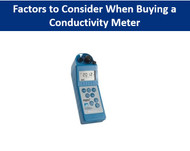Factors to Consider When Buying a Conductivity Meter and More
Posted by David Cannon on 23rd Oct 2020

Conductivity and salinity are two familiar terms for people who draw water from water wells, or own ponds, and swimming pools, or have been doing fish farming or growing vegetables through hydroponics methods. Of these, conductivity is termed as the ability of water to conduct electricity and this comes from dissolved salts and inorganic chemicals in water. Pure distilled water has poor conductivity when compared to water that is not distilled or filtered. Why is this conductivity important? How to choose the right conductivity meter for my application? This post focuses on these questions and more.
Importance of Conductivity Measurement
Conductivity is measured for different reasons:
- To measure total dissolved salts in water
- To measure conductivity and analyze diluted elements
- To determine the quality of water purity
- To ensure the quality of food products in food processing industries
- To monitor the changes in salinity in fish tanks and save fishes from dying
Know About the Types of Conductivity Meters
Conductivity is measured using electronics connected to a sensor. This sensor is usually immersed in a solution. Based on utility, the following are a few popular types of conductivity meters to choose from. Needles, to say conductivity meter features differ across these types.
- Handheld Testers: These conductivity meters are hand-held and usually dropped in water to measure conductivity, pH values, salinity, and so on.
- Benchtop Meters: They are widely used in laboratory settings and fitted permanently on the table. These meters are usually larger than portable meters and provide accurate readings.
- Portable Meters: These conductivity meters are smaller than benchtop meters and are used for field measurements. Portable conductivity meters are usually used by researchers working in the environment sector.
- Inline Meters: These conductivity meters are installed in manufacturing facilities to analyze the quality of water.
Factors to Consider When Choosing a Conductivity Meter
If you plan to buy a conductivity meter for your applications then here are certain things to consider.
- Address Requirements of Your Application: The answer to how you are going to use this meter will ease your selection. You need to focus on factors such as:
- Installation requirements
- Desired conductivity measurement range
- Chemical compatibility of wetted parts and chemicals dissolved in water
- Pressure, temperature, and other conductivity system specifications
- Material of construction and size of piping
- Particulates dissolved in water and their size
- Performance requirements of pressure and temperature
- Choose the Right Electrode Technology or Conductivity Sensor: Conductivity meters are distinguished into two types based on their underlying technology. They are:
- Contacting Type Conductivity meters: These conductivity sensors comprise two insulated electrodes, which are made of titanium-palladium alloy, 316 stainless steel, or graphite. The electrodes are produced in a typical size and spaced at a particular distance to produce a cell constant. The cell constant K=1.0 indicates that the two electrodes are placed one centimeter apart with a dimension of one square centimeter each.
- Electrodeless Conductivity Meters: These conductivity sensors possess no electrodes, rather they feature two types of torroids Torroid A and Torroid B. The Torroid A introduces AC current in the solution. The AC current flows in the closed loop through the bore of the sensor and the solution. Torroid B mainly senses the magnitude of the current induced. This magnitude is always proportional to the conductance.
You need to consider the desired signal output when choosing a conductivity meter equipped with either of the two technologies for your application.
- Flexibility: Conductivity measurement is not always easy because liquids like certain alcohols and pure water are affected by changes in temperature. So, if you plan to measure a wide range of liquids, you must invest in a conductivity meter that enables you to adjust temperature coefficient to compensate for the measured properties. Along with this, adjustable cell constant is another factor to look at when choosing a conductivity meter. There are several conductivity meters which supports cells with constants between K=0.01 to 10. At times, you may need to adjust the measurement of cell that may have a constant other than K=1.0.
- Automatic Sensing: Many conductivity meters are operated manually, which means you need to set the measurement range before every application. However, choosing automatic sensing conductivity meter may help. These meters are known to detect the range automatically and need no human intervention as well.
Having understood the importance of conductivity meters and things to look in them, it is also important that you source them from trusted suppliers or manufacturers. Today, you will find these devices under different brand names. However, not all may be suited for your application requirements. This is when you need to approach an expert like Cannon Water Technologies, Inc. The company provides conductivity meters from various industry-leading brands. The experts at the company will help you choose the right conductivity meter based on your application requirements.
